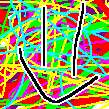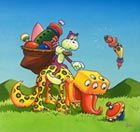| Author
|
528 Hz
|
Mike A
Subra

Started Topics :
185
Posts :
3954
Posted : Feb 11, 2011 10:45
|
|
moki
IsraTrance Junior Member

Started Topics :
38
Posts :
1931
Posted : Feb 11, 2011 11:23
|
not much science in the link, mike. it is telling to leyens what is water vortex implosion and what is torsion fields and why the whole thing resonates in their geometrical forms.
i thought i would suggest another topic than those isotopes, because i feel kind of dissapointed to lose time to write things i consider very sophisticated and challenging ( especially the spectral analysis thing and the under 50th octave of its colours) and at the end to even need to explain that i understand what is isotope... and to insist that i know what i am off to... (btw the sizes of my three balls were referring to imaginary three different possibilities in a question of mathematics , not to qualities of isotopes but whatever).
actually only " pseudoscience" in the link, i know what you would say. although the concept of torsion fields is one of my greatest interest connected to physics http://en.wikipedia.org/wiki/Torsion_field but i know there are thousend times more scientists to say it is pseudo, than those to say it is not. i dont care
and i had a headache yesterday night since i am obviously losing time and actually the person to start the thread does not even demand pure science since his link is quite different direction of human knowledge.
and the headache is going on today, so it feels a bit like intuition that a book on physics and anti gravity would obviously do better.
[/i am off, and good day. this thread has a sort of magnetism but bad reaction on my body at the end of the day.
just going to some people to take a shot or two about a plant doing music by an electromagnetic connection of the plants to the synth. i am sure i will know more about resonance and physics at the end]
[a link i would bother to read after i come back instead of talking further here http://home.comcast.net/~jshlackman/healingdna.html ]
|

|
|
moki
IsraTrance Junior Member

Started Topics :
38
Posts :
1931
Posted : Feb 11, 2011 11:32
|
|
Tranceconspiracy

Started Topics :
5
Posts :
14
Posted : Feb 11, 2011 11:58
|
|
to me it looks like moki is a very effective troll |

|
|
Freeflow
IsraTrance Full Member

Started Topics :
60
Posts :
3709
Posted : Feb 11, 2011 12:18
|
Quote:
|
On 2011-02-11 11:58, Tranceconspiracy wrote:
to me it looks like moki is a very effective troll
|
|
To me it looks like you are the troll right now! haha
|

|
|
Beat Agency
IsraTrance Full Member

Started Topics :
53
Posts :
1752
Posted : Feb 11, 2011 13:29
|
Quote:
|
On 2011-02-11 11:58, Tranceconspiracy wrote:
to me it looks like moki is a very effective troll
|
|
Funny how people are considered being trolls if they have controversial opinions and do not walk among sheep's.
On the contrary your post did not contribute to anything. Mine also did not contribute but hey I told you off 
        www.beatagency.dk www.beatagency.dk |

|
|
mk47
Inactive User

Started Topics :
118
Posts :
4444
Posted : Feb 11, 2011 13:45
|
Quote:
|
On 2011-02-11 13:29, Beat Agency wrote:
sheep's.
|
|
^ sheep
|

|
|
Beat Agency
IsraTrance Full Member

Started Topics :
53
Posts :
1752
Posted : Feb 11, 2011 13:57
|
Quote:
|
On 2011-02-11 13:45, mk47 wrote:
Quote:
|
On 2011-02-11 13:29, Beat Agency wrote:
sheep's.
|
|
^ sheep
|
|

        www.beatagency.dk www.beatagency.dk |

|
|
mk47
Inactive User

Started Topics :
118
Posts :
4444
Posted : Feb 11, 2011 14:16
|
Quote:
|
On 2011-02-11 13:57, Beat Agency wrote:
Quote:
|
On 2011-02-11 13:45, mk47 wrote:
Quote:
|
On 2011-02-11 13:29, Beat Agency wrote:
sheep's.
|
|
^ sheep
|
|

|
|

|

|
|
moki
IsraTrance Junior Member

Started Topics :
38
Posts :
1931
Posted : Feb 11, 2011 14:58
|
a line of border.
|

|
|
Tranceconspiracy

Started Topics :
5
Posts :
14
Posted : Feb 11, 2011 16:07
|
yeah kristian tundra you sure did! boy do i feel told off!
wowser!
i still stand by my opinion that she is trolling the lot of you
but hey you're both great entertainment so keep it up  |

|
|
Beat Agency
IsraTrance Full Member

Started Topics :
53
Posts :
1752
Posted : Feb 11, 2011 16:55
|
Quote:
|
On 2011-02-11 16:07, Tranceconspiracy wrote:
yeah kristian tundra you sure did! boy do i feel told off!
wowser!
i still stand by my opinion that she is trolling the lot of you
but hey you're both great entertainment so keep it up 
|
|
advice:
Embrace irony 
PS. Where did the "Tundra" come from? Usually when someone feel "hit" it's Kristian Elysium          www.beatagency.dk www.beatagency.dk |

|
|
Tranceconspiracy

Started Topics :
5
Posts :
14
Posted : Feb 11, 2011 16:58
|
hehehe well i don't feel hit
it takes a bit more than that 
tundra comes from the good old days
like the old HALLU parties in grey hall copenhagen |

|
|
oggabogga
IsraTrance Junior Member

Started Topics :
10
Posts :
62
Posted : Feb 11, 2011 17:19
|
Mike A:
Quote:
|
“So why is Mr. Emoto selling his water and books now?”
|
|
I don’t think we should start with a new topic; we have already many in this thread.
But to answer I’ll add a popular documentary that you might hate
Zeitgeist. (Google it)
Quote:
|
“This goes against what you just said here.”
|
|
I’m quoting; take this up with Tesla 
Quote:
|
“And the story about Galileo is a nice story, but it has nothing to do with 526Hz.”
|
|
This thread has taken many directions. I would recommend splitting the main subjects.
528HZ (frequency) and Dr. Emoto (isotopes)
Quote:
|
Quote
“This discussion started because of the claim that 526Hz had a special meaning. This was backed by mystical explanations stirred together with some science which was used improperly. This is what I am against. Not spirituality as a whole.”
|
|
You should consider going to page 1 and read.
Quote:
|
“Galileo wasn't trying to sell you anything.”
|
|
Assumptions with no base (the type you don’t like) but the internet can provide you with lots of info. Or you can try your local library.
Quote:
|
“And that's the last I post here. Wasted too much time on this nonsense.”
|
|
Taking the chance that you staid, here is something I think you should read.
Believe me is not a waste of time, the relation to the subject (all of them) will be easy to understand, for a person that knows as much as you. 
(All) I apologize for the length of the following; don’t have a link for it.
Enjoy,
Today, with robots everywhere in industry and movie films, most people
think Al has gone much further than it has. Yet still, "computer experts"
say machines will never really think. If so, how could they be so smart,
and yet so dumb?
================== CAN MACHINES BE CREATIVE? ==================
We naturally admire our Einsteins and Beethovens, and wonder if
computers ever could create such wondrous theories or symphonies. Most
people think that creativity requires some special, magical "gift" that
simply cannot be explained. If so, then no computer could create - since
anything machines can do (most people think can be explained.
To see what's wrong with that, we must avoid one naive trap. We mustn't
only look at works our culture views as very great, until we first get good
ideas about how ordinary people do ordinary things. We can't expect to
guess, right off, how great composers write great symphonies. I don't
believe that there's much difference between ordinary thought and
highly creative thought. I don't blame anyone for not being able to do
everything the most creative people do. I don't blame them for not being
able to explain it, either. I do object to the idea that, just because we can't
explain it now, then no one ever could imagine how creativity works.
We shouldn't intimidate ourselves by our admiration of our Beethovens
and Einsteins. Instead, we ought to be annoyed by our ignorance of how
we get ideas - and not just our "creative" ones. Were so accustomed to the
marvels of the unusual that we forget how little we know about the
marvels of ordinary thinking. Perhaps our superstitions about creativity
serve some other needs, such as supplying us with heroes with such
special qualities that, somehow, our deficiencies seem more excusable.
Do outstanding minds differ from ordinary minds in any special way? I
don't believe that there is anything basically different in a genius, except
for having an unusual combination of abilities, none very special by
itself. There must be some intense concern with some subject, but that's
common enough. There also must be great proficiency in that subject;
this, too, is not so rare; we call it craftsmanship. There has to be enough
self-confidence to stand against the scorn of peers; alone, we call that
stubbornness. And certainly, there must be common sense. As I see it, any
ordinary person who can understand an ordinary conversation has
already in his head most of what our heroes have. So, why can't
"ordinary, common sense" - when better balanced and more fiercely
motivated - make anyone a genius,
So still we have to ask, why doesn't everyone acquire such a combination?
First, of course, it sometimes just the accident of finding a novel way to
look at things. But, then, there may be certain kinds of difference-in-
degree. One is in how such people learn to manage what they learn:
beneath the surface of their mastery, creative people must have
unconscious administrative skills that knit the many things they know
together. The other difference is in why some people learn so many more
and better skills. A good composer masters many skills of phrase and
theme - but so does anyone who talks coherently.
Why do some people learn so much so well? The simplest hypothesis is
that they've come across some better ways to learn! Perhaps such "gifts"
are little more than tricks of "higher-order" expertise. Just as one child
learns to re-arrange its building-blocks in clever ways, another child
might learn to play, inside its head, at Fe-arranging how it learns!
Our cultures don't encourage us to think much about learning. Instead
we regard it as something that just happens to us. But learning must itself
consist of sets of skills we grow ourselves; we start with only some of them
and and slowly grow the rest. Why don't more people keep on learning
more and better learning skills? Because it's not rewarded right away, its
payoff has a long delay. When children play with pails and sand, they're
usually concerned with goals like filling pails with sand. But once a child
concerns itself instead with how to better learn, then that might lead to
exponential learning growth! Each better way to learn to learn would lead
to better ways to learn - and this could magnify itself into an awesome,
qualitative change. Thus, first-rank "creativity" could be just the
consequence of little childhood accidents.
So why is genius so rare, if each has almost all it takes? Perhaps because
our evolution works with mindless disrespect for individuals. I'm sure no
culture could survive, where everyone finds different ways to think. If
so, how sad, for that means genes for genius would need, instead of
nurturing, a frequent weeding out.
|

|
|
oggabogga
IsraTrance Junior Member

Started Topics :
10
Posts :
62
Posted : Feb 11, 2011 17:26
|
================== PROBLEM SOLVING. ==================
We can hardly expect to be able to make machines do wonders before we
find how to make them do ordinary, sensible things. The earliest
computer programs were little more than simple lists and loops of
commands like "Do this. Do that. Do this and that and this again until that
happens". Most people still write programs in such languages (like BASIC
or FORTRAN) which force you to imagine everything your program will
do from one moment to the next. Let's call this "do now" programming.
Before long, Al researchers found new ways to make programs. In their
"General Problem Solver" system, built in the late 1950's- Allen Newell,
J.C.Shaw and Herbert A.Simon showed ways to describe processes in terms
of statements like "If the difference between what you have and what you
want is of kind D, then try to change that difference by using method M."
This and other ideas led to what we call "means-ends" and "do if needed"
programming methods. Such programs automatically apply rules
whenever they're needed, so the programmers don't have to anticipate
when that will happen. This started an era of programs that could solve
problems in ways their programmers could not anticipate, because the
programs could be told what sorts of things to try, without knowing in
advance which would work. Everyone knows that if you try enough
different things at random, eventually you can do anything. But when
that takes a million billion trillion years, like those monkeys hitting
random typewriter keys, it's not intelligence -- just Evolution. The new
systems didn't do things randomly, but used "advice" about what was
likely to work on each kind of problem. So, instead of wandering around
at random, such programs could sort of feel around, the way you'd climb a
hill in the dark by always moving up the slope. The only trouble was a
tendency to get stuck on smaller peaks, and never find the real mountain
tops.
Since then, much Al research has been aimed at finding more "global"
methods, to get past different ways of getting stuck, by making programs
take larger views and plan ahead. Still, no one has discovered a
"completely general" way to always find the best method -- and no one
expects to.
Instead, today, many Al researchers aim toward programs that will match
patterns in memory to decide what to do next. I like to think of this as "do
something sensible" programming. A few researchers -- too few, I think
-- experiment with programs that can learn and reason by analogy. These
programs will someday recognize which old experiences in memory are
most analogous to new situations, so that they can "remember" which
methods worked best on similar problems in the past.
================== CAN COMPUTERS UNDERSTAND? ==================
Can we make computers understand what we tell them? In 1965, Daniel
Bobrow wrote one of the first Rule-Based Expert Systems. It was called
"STUDENT" and it was able to solve a variety of high-school algebra "word
problems"., like these:
The distance from New York to Los Angeles is 3000 miles. If the
average speed of a jet plane is 600 miles per hour, find the time it
takes to travel from New York to Los Angeles by jet.
Bill's father's uncle is twice as old as Bill's father. Two years from
now I Bill's father will be three times as old as Bill. The sum of their
ages is 92.
Find Bill's age.
Most students find these problems much harder than just solving the
formal equations of high school algebra. That's just cook-book stuff -- but
to solve the informal word problems, you have to figure out what
equations to solve and, to do that, you must understand what the words and
sentences mean. Did STUDENT understand? It used a lot of tricks. It was
programmed to guess that "is" usually means "equals". It didn't even try to
figure out what "Bill's fathers' uncle" means -- it only noticed that this
phrase resembles "Bill's father". It didn't know that "age" and "old" refer
to time, but it took them to represent numbers to be put in equations. With
a couple of hundred such word-trick-facts, STUDENT sometimes managed
to get the right answers.
Then dare we say that STUDENT "understands" those words? Why bother.
Why fall into the trap of feeling that we must define old words like
"mean" and "understand"? It's great when words help us get good ideas,
but not when they confuse us. The question should be: does STUDENT avoid
the "real meanings" by using tricks?
Or is it that what we call meanings really are just clever bags of tricks.
Let's take a classic thought-example, such as what a number means.
STUDENT obviously knows some arithmetic, in the sense that it can find
such sums as "5 plus 7 is 12". But does it understand numbers in any other
sense - say, what 5 "is" - or, for that matter, what are "plus" or "is"? What
would ‹say if I asked you, "What is Five"? Early in this century, the
philosophers Bertrand Russell and Alfred North Whitehead proposed a
new way to define numbers. "Five", they said, is "the set of all possible sets
with five members". This set includes each set of five ball-point pens, and
every litter of five kittens. Unhappily, it also includes such sets as "the
Five things you'd least expect" and "the five smallest numbers not
included in this set" -- and these lead to bizarre inconsistencies and
paradoxes. The basic goal was to find perfect definitions for ordinary
words and ideas. But even to make the idea work for Mathematics, getting
around these inconsistencies made the Russell-Whitehead theory too
complicated for practical, common sense, use. Educators once actually
tried to make children use this theory of sets, in the "New Mathematics"
movement of the 1960's; it only further set apart those who liked
mathematics from those who dreaded it. I think the trouble was, it tried to
get around a basic fact of mind: what something means to me depends to
some extent on many other things I know.
What if we built machines that weren't based on rigid definitions? Wont
they just drown in paradox, equivocation, inconsistency? Relax! Most of
what we people "know" already overflows with contradictions; still we
survive. The best we can do is be reasonably careful; let's just make our
machines that careful, too. If there remain some chances of mistake, well,
that's just life.
|

|
|
|